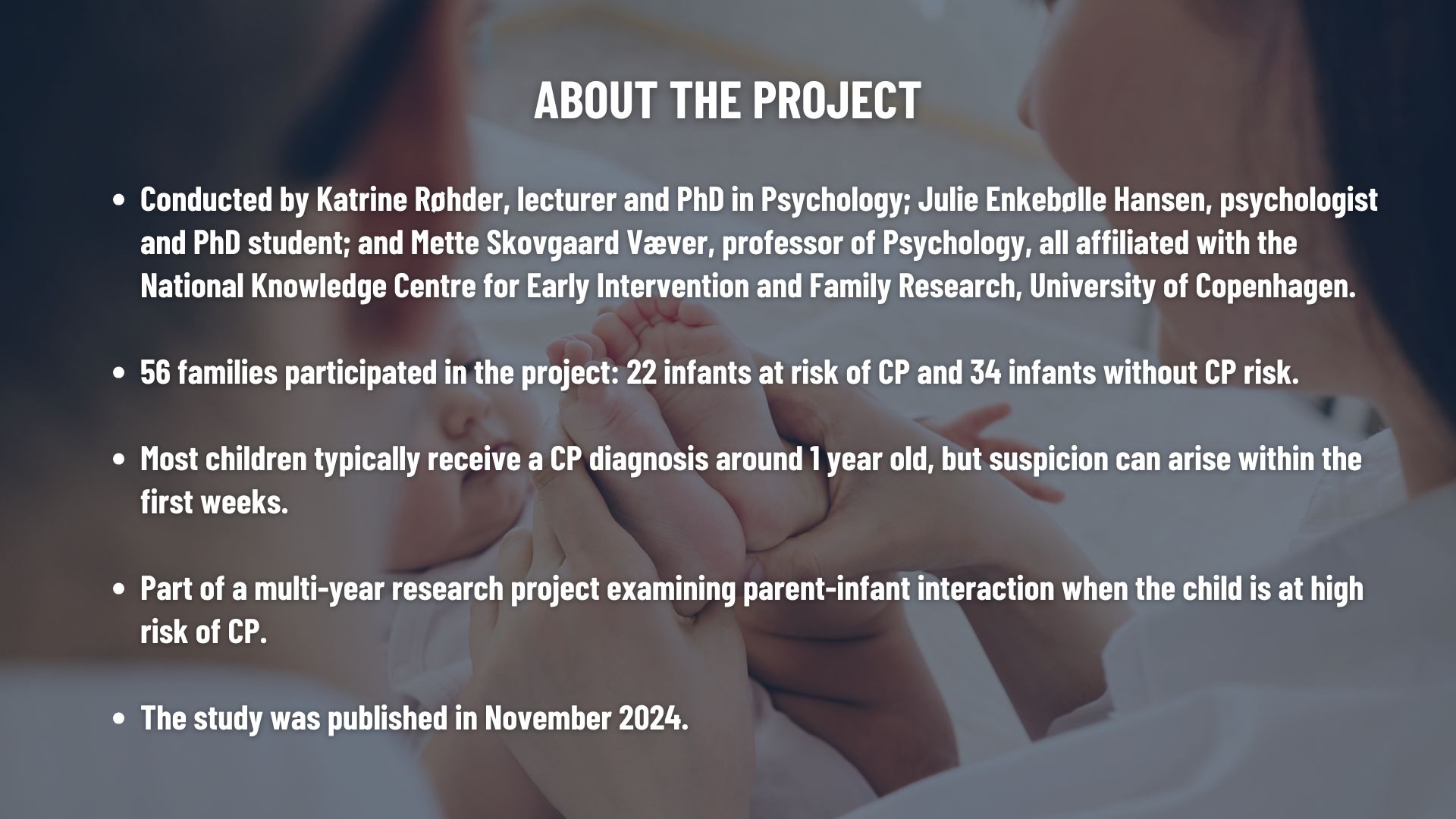Research news: Increased risk of depression in new mothers of children with suspected CP
A new study shows that mothers of children with suspected CP have an increased risk of postpartum depression. The researcher behind the study hopes for more knowledge about the psychological factors affecting families during CP evaluation.
“I think it is so important to examine how parents are mentally affected when they have a child with suspected CP, as this can play a role in the child’s social and emotional development,” says Katrine Røhder, PhD in Psychology at the University of Copenhagen and lead author of a new study supported by the Elsass Foundation.
The study shows that mothers of children with suspected CP have a 15 times higher risk of showing signs of postpartum depression compared to mothers of children without CP.
When parents are told that their newborn might have CP, it can be a difficult situation for the entire family. Uncertainty and thoughts about the future can take up a lot of space alongside assessments and consultations at the hospital or the municipality. At the same time, there is also a small newborn to care for.
The results from the new research study also underline that there can be a significant burden on the family in the first year after birth while the child is undergoing evaluation for CP.
Increased risk of depression
When the babies in the study were 15 weeks old, the mothers completed a questionnaire also used by Danish health visitors to screen for postpartum depression (Edinburgh Postnatal Depression Scale). The responses were compared with those of a group of mothers of children without CP risk.
The results show a clear difference between the two groups. Thirty percent of mothers of children suspected of CP show signs of actual postpartum depression, compared to just under 3% in the comparison group.
“Thirty percent is quite high, especially when we know that the corresponding rate is 10–15% of mothers in the general population. This gives us a better understanding of how mothers’ mental health can be affected when they have an infant with suspected CP, so we can intervene and help them in the best possible way,” says Røhder.
According to Røhder, it is important to emphasize that there are also some mothers in the study who did not show signs of depression on the questionnaire.
The study did not examine depression symptoms in fathers, but Røhder hypothesizes that fathers might also show symptoms in a screening.
There is, however, little research on fathers, and Røhder hopes that there will be opportunities to research this area more in the future.
Slow language development
The researchers were also curious whether certain factors related to the child’s development increase the risk of postpartum depression in the mother. It turned out that slow communicative development in the child increases the risk for postpartum depression.
At 15 weeks, it is not language itself but early communicative signals that are examined: Does the child babble? Does it respond when spoken to? Does it smile or make sounds when a parent or professional talks to it?
According to Røhder, it is natural that fewer communicative signals from the child can affect the mother’s mood:
“If the child participates less in interaction, and the mother does not receive as much communication back, it can reinforce an emotional reaction in the mother. Experiencing reciprocity in interaction is important, and this applies to all parents.”
Røhder further explains that the study did not investigate causality: Do the mother’s depression symptoms affect the child’s communicative development, or does the child’s slower development result in depressive signs? Or do the two affect each other simultaneously?
“We do know, however, that if a person is significantly affected by depression, the sadness and hopelessness can make it harder to experience joy with their child. When you are sad or stressed, you may not be as attentive or smile as much as usual, which is completely natural given the situation the parents are in,” says Røhder.

Katrine Røhder is PhD in Psychology and lecturer at the University of Copenhagen. FOTO: Elsass Fonden
"When you have a child with suspected CP, it can be difficult to meet all expectations. But it is really important to remind yourself that you are doing enough. There should also be space just to sit on the sofa with your child and enjoy each other’s company without any training or obligations."
Lack of knowledge about parents’ mental health
Other studies have shown that mothers of older children with CP have an increased risk of depression, anxiety, and stress, but no studies until now have examined mothers of infants, Røhder explains:
“There is a lack of knowledge about how parents and the child are doing in the very early period after birth. Is the child thriving? Is the child happy and engaging with the parents? And how does attention on CP affect the parents and the parent-child interaction?”
According to Røhder, several factors may contribute to the higher risk of postpartum depression. Mothers of children with suspected CP often have experienced a difficult or traumatic birth. They may also have been admitted to a neonatal unit after a premature birth - something many families experience as highly stressful.
“We also know that coming to terms with a child’s diagnosis can be a process – one that may take time and differ from parent to parent. At the same time, it is completely natural for thoughts about the diagnosis’s impact on the child and family to affect your mood or bring temporary sadness,” explains Røhder.
Sit on the sofa with your child
There are many things parents must manage with a newborn under CP evaluation: doctor visits, examinations, physical and occupational therapy sessions, daily motor exercises, municipal consultations, and many other demanding tasks. But according to Røhder, it is also important that parents try to spend time with the child without doing anything.
“When you have a child with suspected CP, it can be difficult to meet all expectations. But it is really important to remind yourself that you are doing enough. There should also be space just to sit on the sofa with your child and enjoy each other’s company without any training or obligations,” says Røhder, continuing:
“When you smile, laugh, and play with your child - without aiming for any particular outcome - it also positively influences the child’s social and emotional development.”
Speak up and ask for help
If you feel persistently sad, or if interaction with the child feels difficult, e.g., if the child cries, is hard to soothe, or turns away when you try to talk or play, Røhder stresses that it is important to take care of yourself, as your well-being can affect your child’s well-being.
“You need to address it and speak out about how you feel - to your partner, family, friends, or the health visitor,” recommends Røhder, adding that this is not always easy:
“There can be a lot of stigma around postpartum depression, and guilt may also come into play - guilt over not being completely happy as a new parent. But it is so important to talk to someone about it. You may also discover that this is relatively common and that others have had similar reactions you can identify with.”
Previous studies on postpartum depression show that maternal depression can affect a child’s cognitive or communicative-social development. But many factors play a role: Does the mother receive help? Is there a partner that can help? Is it a short-term or longer-term depression?
Røhder hopes that the new knowledge will raise awareness among families and professionals about the increased risk of postpartum depression among families undergoing CP evaluation:
“Hopefully, the study will help us pay closer attention to these families and ask how they are really doing and how daily life works at home when we meet them as professionals. This way, any postpartum depression can hopefully be identified, so mothers and families can get the necessary help and support,” concludes Røhder.
What can you do if you notice signs of postpartum depression?
- Remember that it is a difficult period and allow yourself to experience difficult or taboo feelings.
- Talk with your partner or close relations about the difficult feelings.
- Seek help: Contact professionals - e.g., your health visitor - or speak with your doctor about a referral to a psychologist experienced with families of infants and children facing extra challenges.
- Do your best and enjoy your child. Smile, laugh, and play with them - without needing to achieve anything.


